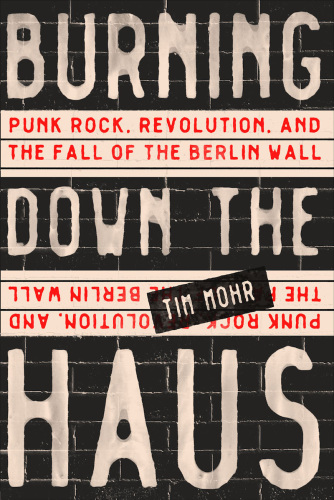
Burning Down the Haus
Punk Rock, Revolution, and the Fall of the Berlin Wall
کتاب های مرتبط
- اطلاعات
- نقد و بررسی
- دیدگاه کاربران
نقد و بررسی

June 1, 2018
Award-winning translator Mohr, who once made his living as a club DJ in Berlin, explains how a group of East Berlin teens became enamored of punk after hearing the Sex Pistols on British military radio broadcasts. Security forces harassed them, but punk resistance contributed to the fall of the Wall.
Copyright 2018 Library Journal, LLC Used with permission.

Starred review from July 30, 2018
In this lively narrative, music journalist and former Berlin DJ Mohr takes readers on a profanity-laden, up-close-and-personal tour of the punk rock scene of 1980s East Germany. He follows notable figures in the scene—“Major” (who was 15 in 1977 when she became, in Mohr’s retelling, the first punk in East Germany), “A-Micha,” “Colonel,” “Pankow,” “Chaos,” “Otze,” and others—and their associated bands as they evolve from a handful of disaffected youths influenced by outside radio and bootleg Sex Pistols albums to a relentless movement of politically minded revolutionaries determined to change a corrupt system from within. Mohr makes clear the punks weren’t seeking a reunited Germany, just an East Germany where they’d be free to express themselves, yet their movement contributed to the fall of the Berlin Wall. He chronicles the ongoing clashes between the East German authorities and several microgenerations of punks, describing a compelling war of subversion, persistence, attrition, and defiance, where every act meant to crush spirits and enforce conformity only helped to fan the rebellious flames. The short chapters and punchy prose, coupled with thorough research, give the reader a front-row seat to the events of the ’80s. This take on punk evolution is engaging, enlightening, and well worth checking out. Agent: Anna Stein, ICM Partners.

July 15, 2018
How a forbidden punk-rock underground fomented rebellion against totalitarian East Germany.A translator and former Playboy staff editor and club DJ in Berlin, Mohr carefully documents a rousing, little-known Cold War story, showing how alternative culture developed in the Eastern Bloc in a similarly grass-roots fashion as elsewhere but for greater stakes. "The ethos of East Berlin punk," he writes, "infused the city with a radical egalitarianism and a DIY approach to maintaining independence." But during the 1980s, homegrown punks were seen as both a nuisance and threat, worthy of repression. Based in part on interviews with survivors, Mohr ably documents how regional small-scale punk scenes grew and connected nonetheless. From the start, he notes, "groups of punks started to attract attention from security forces everywhere they went." East Germany provides a vivid backdrop to the narrative. Conformity to state-supervised existence was enforced by surveillance and informants, so punks' embrace of abrasive music and fashion was inherently political. As the author memorializes one uncompromising early punk, "he had always hated the way his whole life was predetermined by the state." Despite Stasi harassment and harsh prison sentences for "antisocial" acts including graffiti and subversive lyrics, punks made common cause with socially conscious churches and developed illicit performance and taping networks. Despite the state's hostility, the punk movement was thus well-positioned to contribute to the civil unrest that fueled the Eastern Bloc's unexpected collapse. Mohr closes by documenting how the initial punk squatters blossomed into a mass movement that helped preserve East Berlin's dilapidated architecture. "Eastern bands," he writes, "died off quickly after the fall of the Wall....For Eastern punks, the original enemy had been vanquished." The author dives deep into a chronology of the ferocious early bands and committed scenesters whose rebellion carried steep risks. His writing focuses on their experiences and stays attuned to the punk ethos, only occasionally becoming rant-y or rambling.An appealing, lively cultural history worth reading in an era of corporate punk nostalgia.
COPYRIGHT(2018) Kirkus Reviews, ALL RIGHTS RESERVED.

























دیدگاه کاربران